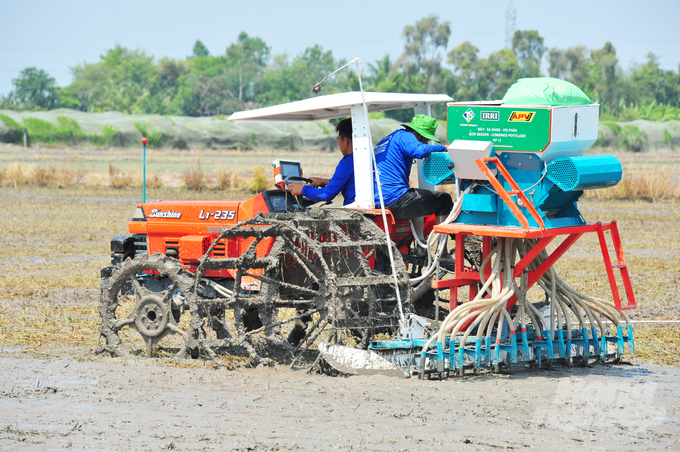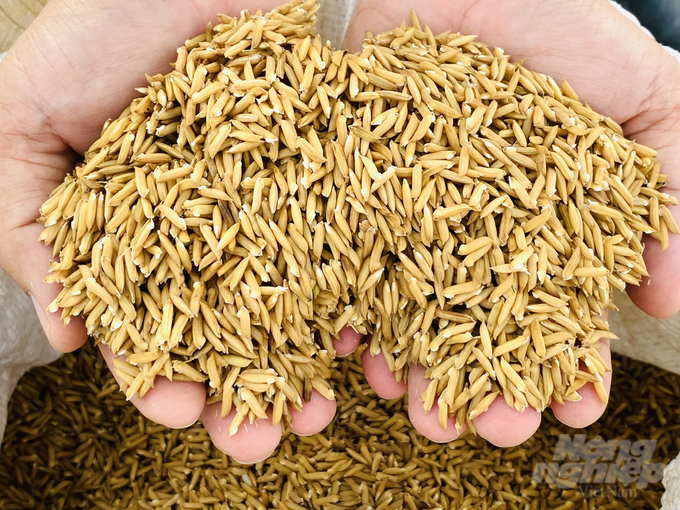May 23, 2025 | 11:33 GMT +7
May 23, 2025 | 11:33 GMT +7
Hotline: 0913.378.918
May 23, 2025 | 11:33 GMT +7
Hotline: 0913.378.918

Model of applying mechanization in sowing with a row seeder. Photo: Le Hoang Vu.
The Department of Agriculture and Rural Development of Can Tho City, in conjunction with the International Rice Research Institute (IRRI), Binh Dien Fertilizer Joint Stock Company, and Tu Sang Private Limited Company, organized the implementation of a high-quality rice cultivation model on March 4 at New Green Farm Cooperative (Can Tho City). This initiative aims to promote green growth in the Mekong Delta during the 2024 summer-autumn crop while simultaneously reducing emissions.
The objective of the model is to increase fertilizer efficiency, boost productivity, decrease greenhouse gas emissions, and encourage mechanization in seed dispersal.
The Deputy Director of the Department of Agriculture and Rural Development of Can Tho City, Ms. Tran Thi Kim Thuy, stated that the agriculture sector of Can Tho City is implementing a high-quality rice cultivation model for this year's summer-autumn rice crop, with an emphasis on reducing emissions and promoting green growth at the 1.2-hectare household of Mr. Dong Van Canh in Tan Hung ward (Can Tho City), a member of the New Green Farm Cooperative.
The model utilizes the verified OM18 variety of rice, sown at a density of 60 kg/ha in a 35 x 15 cm spacing. In the model, 73 kg/ha of fertilizer was applied, which was a 20% reduction compared to conventional cultivation.
The units installed automatic methane concentration measurement chambers and automated water level sensors immediately following cultivation. The purpose of developing and maintaining the model was to provide assistance and coordination for the "Sustainable Development of One Million Hectares Specializing in High-Quality Rice Cultivation and Low Emissions Associated with Green Growth in the Mekong Delta by 2030" project.
Participating in the model, Mr. Dong Van Canh, a member of the New Green Farm Cooperative, stated that he leveled the land and created waterways prior to sowing. Utilizing a seed sowing machine manufactured by Tu Sang Company, fertilization and sowing were conducted simultaneously.
The seedlings utilized must conform to certification-validated quality standards. The seeds are sun-dried for two to three hours and their germination is evaluated prior to submerging. Following a 10-minute treatment with a 15% saline solution, the seeds were cleansed multiple times with clear water. Scarification of freshly harvested seeds intended for immediate sowing with 0.2% nitric acid is necessary to promote germination. Soiling is restricted to seeds that satisfy the specified criteria for shattering. By adjusting the sowing density to 60kg/ha, a seed sowing machine is utilized.
The fertilization procedure adheres to the methodology employed by Binh Dien Fertilizer Joint Stock Company. It comprises two topdressings and one basal fertilization.
The basal fertilization is conducted at a rate of 150kg/ha using Binh Dien Bio-Calcium Dau Trau Fertilizer (22% CaO, 2.2% MgO, N 1.5%). A rate of 220 to 240 kg/ha of Binh Dien Bio-Rice 1 Fertilizer (19-12-6) is utilized for basal fertilization. Between 100 and 150 kg/ha of Binh Dien Bio-Rice 2 Fertilizer (17-4-15) is applied during tillering.

The rice variety used in the model is the certified variety OM18, with a sowing density of 60kg/ha. Photo: Le Hoang Vu.
Before, during, and after the rice season, pest management must adhere to the "4 rights" principle and ensure the safety of rodents and pest control, plant protection products, and plant protection products. Utilize exclusively those plant protection products that are included in the authorized inventory of plant protection products in Vietnam. Herbicides combined with pre-emergence herbicides (Pretilachlor, Butachlor) and post-emergence herbicides (Bispyribac Sodium, Pyrazosulfuron Ethyl) are utilized for weed control.
In the case of places containing grassy plants, their removal is imperative both prior to seed shedding and once more prior to sowing. Implement proactive snail control measures by installing bamboo or wooden supports in flooded areas to entice snails for egg-laying and by releasing ducks and fish to consume juvenile snails and snail eggs. To manage detrimental insects, administer suitable plant protection products in accordance with the stages of growth.

Install an automatic greenhouse emission control system and automatic water level sensors in the field. Photo: Le Hoang Vu.
Alternating dry-flood water management is implemented during favorable conditions (prior to the onset of the monsoon season). Water entry occurs when the water level in the field falls below 10–15cm relative to the field surface. To control vegetation, drain water prior to sowing and introduce water to the field 5 to 7 days after sowing. To prevent water scarcity in the fields, maintain water at a depth of 3 to 5 centimeters prior to each fertilizer application, as well as prior to and following the tillering stage. Ten to fifteen days prior to harvest, drain water to facilitate the operation of combined harvesters.
Translated by Linh Linh

(VAN) The mutual export of agrifood products between the European Union (EU) and the United Kingdom (UK) must occur again without certification, border controls or other red tape. This was agreed at the UK-EU summit.
/2025/05/22/5121-2-173645_677.jpg)
(VAN) NBSAP Tracker identifies strengths and areas for improvement in the National Biodiversity Strategy, based on each region’s priorities and capacities.

(VAN) The draft amendment to the Circular on rice export trading stipulates a periodic reporting regime for rice exporting enterprises.

(VAN) Dong Thap farmers attained an average profit margin of 64% during the summer-autumn 2024 crop (first season), while An Giang and Kien Giang farmers followed with 56% and 54%, respectively.

(VAN) As a doctoral student doing research on renewable energy and electrification at Harvard University, the author shares his musings on electricity, nature, and countryside memories.

(VAN) The decree on Extended Producer Responsibility (EPR) ensures transparent management and disbursement of support funds, avoiding the creation of a “give-and-take” mechanism.

(VAN) Hue City rigorously enforces regulations regarding marine fishing and resource exploitation, with a particular emphasis on the monitoring of fishing vessels to prevent illegal, unreported, and unregulated (IUU) fishing.